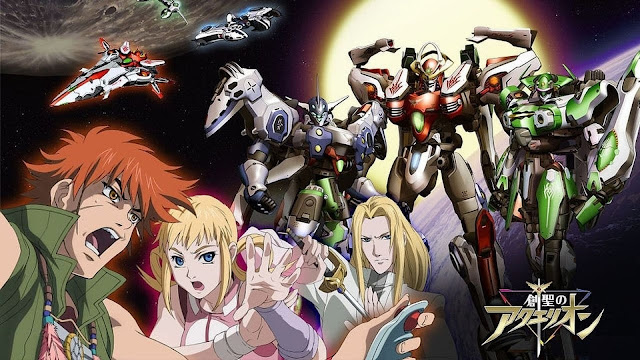PHENOMENALITY: *marvelous*
MYTHICITY: *good*
FRYEAN MYTHOS: *adventure*
CAMPBELLIAN FUNCTION: *metaphysical, psychological*
I've not yet reviewed any of the anime works of Shoji Kawamori, best known for the MACROSS franchise, so I can't indulge in many cross-comparisons with this 26-episode TV show. But I can observe that while MACROSS was straight science-fiction, AQUARION melds tropes from the SF-subgenre known as "giant mecha" with motifs from myth and fantasy.
Aquarion is the narrative's most prominent fighting robot, whose powers the young heroes must strive to master in order to protect their world. The robot's name is never explained, but Kawamori's most logical reference would be to astrology's notion of "the Age of Aquarius," a great shift in the celestial realms which has consequences for mortal life. This interpretation finds support in the fact that the events of AQUARION, like those of heavenly shifts in the zodiacal signs, take place over the course of eons.
The main action takes place in a far-future version of Earth, but every episode makes some reference to crucial events that transpired 12,000 years ago. During that era Earth was attacked by Shadow Angels, winged beings who feed upon the "prana," the life-energies, of human beings. In contrast to the angels of Judeo-Christian lore, the invaders utilize their own giant mecha, which would seem to mark them as either aliens or a parallel species that may have developed on Earth, though the scripts do not dwell on the Shadow Angels' origins. The latter explanation seems better, since the archaic Angels dwelled at some point in a hidden city, Atlantia, whose name is a clear reference to the Greek legend of Atlantis. The Angels also have some nebulous relationship to a "World Tree" deep at the heart of the planet Earth, A turncoat Angel named Apollonius defeats his kindred with the help of the giant mecha Aquarion, after which the surviving Angels seemingly retreat into the World Tree and descend into sleep for the next twelve millennia.
At the heart of Apollonius' betrayal of his people is his love for a human named Seliane (a name possibly indebted to that of the Greek moon-goddess Selene). However, Apollonius previously sustained some possibly-romantic relationship with the Angels' ruler Toma, and 12 millennia later, Toma still craves revenge, even though Apollonius and Seliane are long deceased. Some measure of revenge is possible, though, because all contemporary Earth-dwellers are resolutely convinced that the spirits of Apollonius and Seliane are destined to be reincarnated in their era. to help Earth against the inevitable revival of the Shadow Angels.
DAEVA, a paramilitary organization, trains adolescent warriors, called "Elements," in their attempts to master the mecha Aquarion. Four of these characters receive only moderate development: "new fish" Jun and Tsugumi, horny bastard Pierre, and perpetually mournful Reika, whose lover lies in a coma thanks to an attack by the recrudescent Angels.
The lion's share of narrative focus rests on a "four-sided" romantic triangle. Female warrior Silvie dotes upon her brother Sirius and fancies that the two of them will prove to be the reincarnations of Seiliane and Apollonius, meaning that they will also become lovers. Sirius does not cherish similar dreams, but seems to have some interest in Reika-- though he does become irate when a new Element, Apollo, joins the team and begins a "love-and-hate-at-first-sight" relationship with Silvie. The fourth side of the triangle is Toma, who also believes one of the Elements will be a reborn Apollonius, and who intends to take bloody vengeance on his (maybe) former lover.
Despite all the romantic travails, AQUARION boasts almost no transgressive fanservice (though Apollo does get his face close to Silvie's privates). Yet, as if to take advantage of the burgeoning hormones of the Elements, they all experience sexual ecstasies whenever they summon the power of Aquarion in battle-- which doesn't ever seem to distract them from fighting the good fight.
Viewers of AQUARION do not learn exactly which character reincarnates what spirit; this is left to a follow-up series. What the 26 episodes repeatedly offer is the Japanese theme of Nietzchean "self-overcoming" through the pursuit of martial excellence. Silvie "self-overcoming" is tied to her need to find a male love-interest who isn't her brother, while Apollo, having been raised apart from other humans, must seek to become more socialized. The secondary heroes don't get nearly as much attention, though I was impressed by an inventive plot in which Pierre becomes "sex-addicted" to the experience of the mecha-ecstacy. It sounds risible stated in that manner, but the script does give the idea dramatic heft. I should also note the existence of peripheral Element-character Rena, who usually does not pilot Aquarion but rather stalks around, dropping hints that she may be a vampire-- which doesn't add up to anything, though it does recapitulate the energy-sucking propensities of the Shadow Angels.
At the same time, though Toma is the only Shadow Angel who acquires any personality, AQUARION also includes a subplot in which the Angels must come to terms with human independence. The disparate groups are forced to work together when the World Tree is destroyed, which will result in Earth's obliteration as well. Toma and two of the Elements must use Aquarion to take the place of the World Tree, so that the mecha from Atlantia becomes a new "Atlas," though the script doesn't actually make reference to the Greek giant who held up the sky. The references to Hindu lore, like the use of the term "prana," don't integrate with the Greek lore as well as a myth-lover might like, but on the whole AQUARION is far more mythic than the average mecha-series.




No comments:
Post a Comment